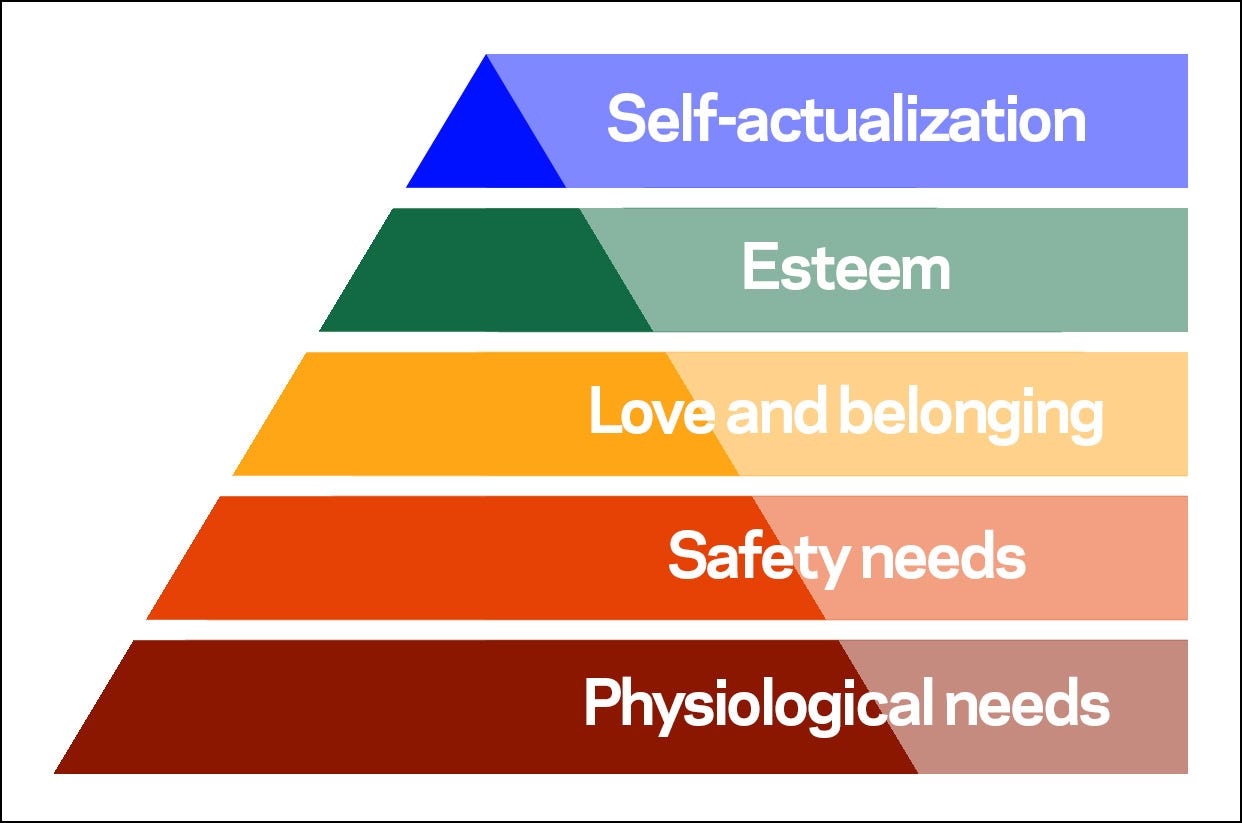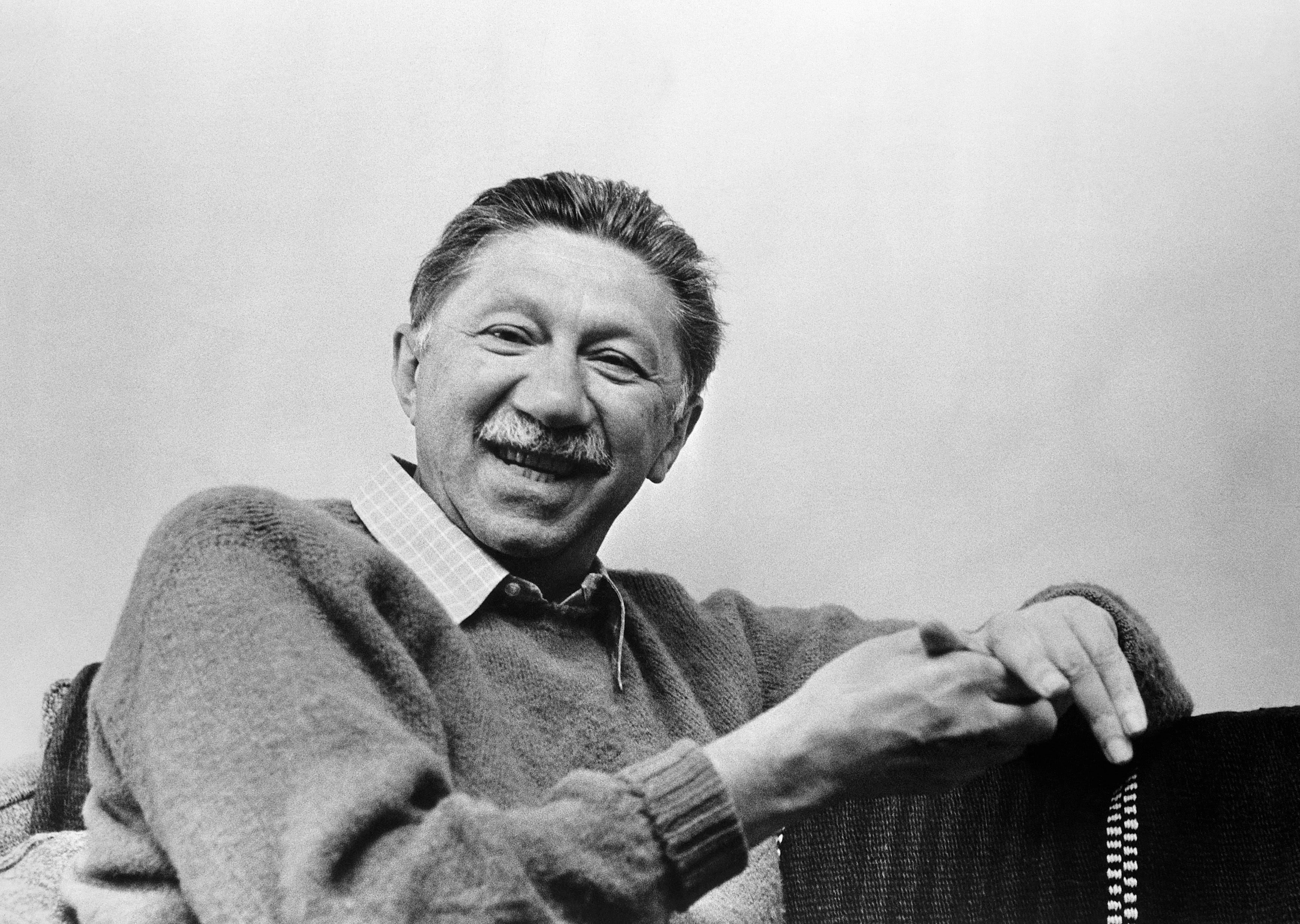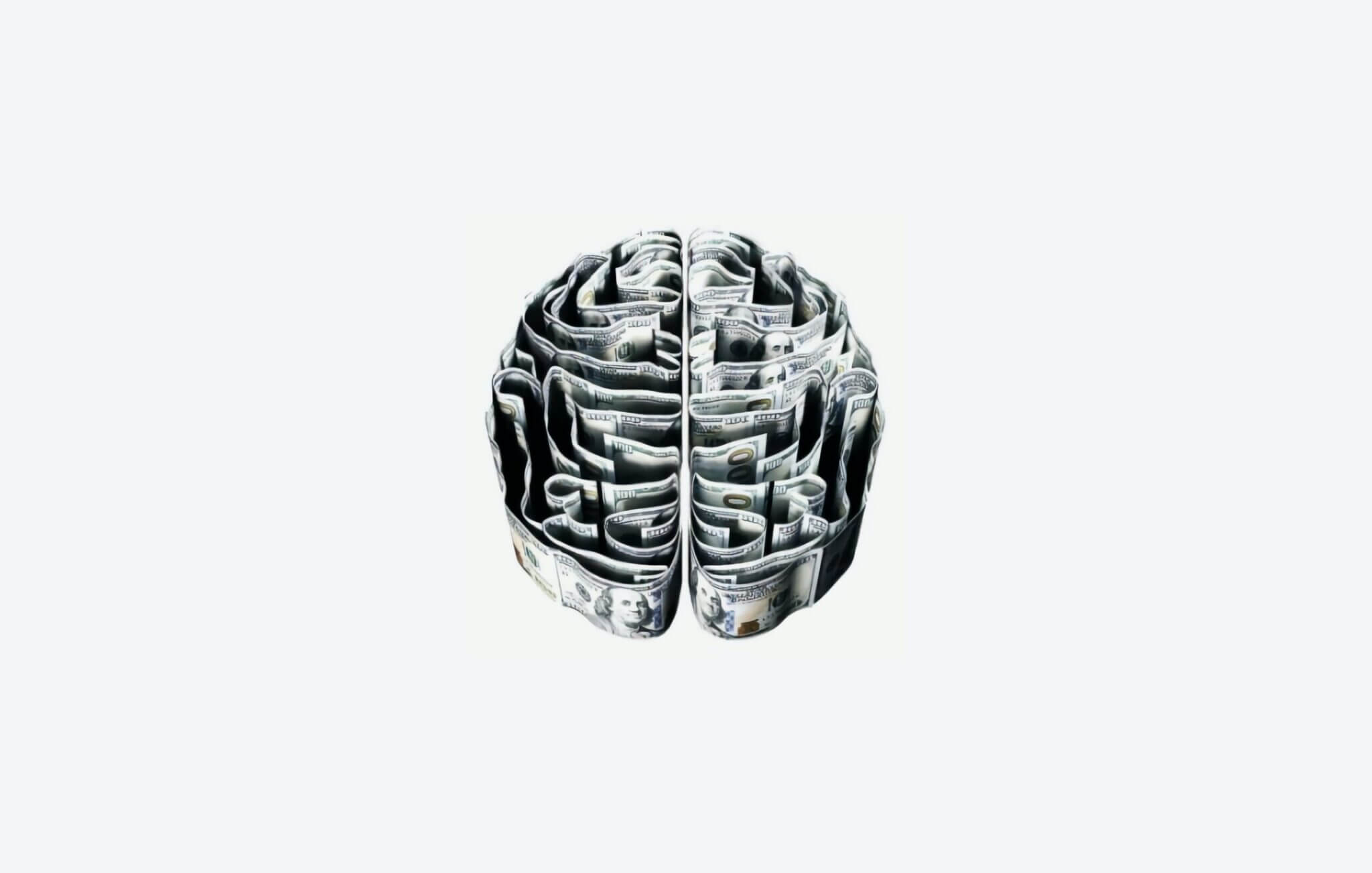Abraham Maslow’s Hierarchy of Needs implies a linearity, with self-actualization crowning our enlightenment, once the rest of the pyramid’s ‘baser needs’ are met. While powerful, it is a misguided notion. In reality, we need to start “at the top”. Here’s why.

His was a brilliant piece of reflective — if intuitive — insight that gave form to a fundamental idea: that needs precede wants. Said another way, it proposed that without first establishing a foundation of health, safety and shelter, the pursuit of personal fulfillment seems trivial — a new-age conceit, even.
In truth, it’s not that simple.
Abraham Maslow’sHierarchy of Needs takes the form of a pyramid, reinforcing the central notion that like the ‘real’ pyramids that inspired it, one builds a life upward, laying one gravity-laden layer of wellbeing atop the other, in succession. Gravity is symbolic in his diagram, but the basis is the same.
In principle, the theory goes, we must first satisfy our physiological needs (food, shelter, clothing). Second, once those are in hand, we can secure the psychological need for safety — both physical and fiscal. Third, sequentially, we can focus on finding intimacy — the stuff of emotional fulfillment in the form of companionship. Once all of these “needs” are met, we can attend to the relative luxury of pursuing esteem in the community: respect, status, and the like. And finally, the pyramid culminates in the highest order of (perceived) human activity: that of self-actualization — the stuff of bodhisattvas, sadhus and “luminaries” like Gandhi, King, Sinek, Schmachtenberger, Chopra and Robbins.
Or at least that’s what an entire section of the bookstore tells us.
You remember bookstores, right?
But life isn’t linear. Some (most; all) of us need to explore, uncover and develop different parts of ourselves, to allow us to act effectively toward achieving those very basic needs, way down the pyramid.
In other words, sometimes (often; always), Maslow’s categories of wellbeing, however well-founded they are, don’t exist in a hierarchy, as such. While I’m at it, nor do they unfold linearly.
That’s because life circumstances like our upbringing, the societal constructs in which we are born and live, our relationships, and sheer serendipity, along with the psychological state of our own personal emotional development at any given point in time, have profound influence over — and create the context to — our lives. Accordingly, because of our distinctly complex socio-economic-emotional constructs, we are forced to continually summon the totality of our capacities — in paucity or in richness — toward the pursuit of holistic wellbeing.
That is, toward (self-)love, (self-)acceptance and purpose.
A common Western psychological conceit goes something like: “Once I have a good job, money in the bank and an adequate place to live, then I’ll have the time/energy/security/confidence to focus on finding a mate, having children, pursuing my passions and even the luxury of advancing my self-actualization.” Often, though, it’s the very thinness of our self-awareness that gets in the way of our success in meeting our “basic needs”, which in turn make it impossible to climb Maslow’s pyramid.
That’s because the way life really works isn’t linearly; it’s iterative. We explore; we learn; we apply; we learn from that, good and bad; we adjust; we re-apply; and we repeat these steps ad infinitum, until we die. If we’re lucky, we get somewhere close to our highly individual vision of “a life well lived”. But this, too, is a moving target; because all of that learning, discovery and stabbing in the dark leads us to understand the world differently from when we established our fantasies. And so the whole enterprise is in a constant state of iterative evolution. A knotted-up tangle of yarn comes to mind — not a pin-strait “A to B” line — to evoke the idea of what life looks like, for most (all) of us. Somewhere in that knotted mess, we can find shelter, food, jobs, mates, baubles, and self-awareness.

A Typical Life
Let’s say you’re the typical Westerner, with no real idea what your purpose or passions are at the tender age of 18 or 20, when many (most) of us must choose our professional paths. So we pick something, study or train in it, and stumble into Job A, once we’re done. Job A exists as often as not because it was local, or we knew someone who knew someone, or an employer who took pity on us “gave us a shot.” Once employed, we do what we must until we’re promoted to floor manager, or lead stylist, or tenured professor, or sergeant, or whatever form of executive leader to which our professions might eventually lead us, over time. At one point during our odyssey, we meet someone — at school, at work, through friends or at a bar. We have babies with them; and then plummet down the rabbit hole of economic hardship: the kids, our mortgage, vacations we can’t afford, and that Peloton bike we’ve eyed of late, and finally lost our resolve not to buy. Then, right on the tail of all that success, we obsess about where our careers can go from here, so that we can afford to get out of debt, or build “real” wealth, and security.
You know, like the Joneses.

While we’re pumping out cortisol chasing pennies and children — the life we’ve built — some of us accidentally meet a future co-conspirator — one who has a company, a startup or an idea, and could use “a gal like you”. So we jump off of our hamster wheel (job), and start anew on another one. Sometimes, that shift gives us confidence to ditch the hubby we made an early mistake over falling for and marrying, as grateful as we are for our thankless children. We then slug it out over who gets the proceeds from our starter lives, losing a third of it all to the lawyers in the process. Regardless, now renewed in our second lives, we attack the shiny new career with gusto. We get a haircut, a new wardrobe, tell all our friends about how much better it is than our old lives, maybe even believing part of it for a hot minute, and we do all the things we couldn’t when our husband put his foot down in disagreement, but now that “I’m the boss of me”, all I have to do is decide…
At some point, we figure out that our new life is just like our old life. The hot trainer we met when we were getting back into dating shape is also a douchebag, like the deadbeat dad we left; and besides, he never liked our kids anyway, but we ignored it because the sex was so good and we liked the idea of being a MILF. That was before our libidos failed us, when the luster of the honeymoon phase wore off. The new job turns out to be a slog, like the old one; it’s just that we’re just selling ad space instead of widgets now. How 2020 of us. Our bosses are also as arrogant or incompetent as the ones we left behind. And we are still struggling — even with our raises and our much-vaunted equity — to make ends meet, because every time we jump tax brackets we increase our spend. Life is increasingly expensive, increasingly complex, increasingly lonely and we still have no idea WTF to do with all of it, or what our “true purpose” is.
And time seems to be breathing down our necks. That is, when we can ignore the pain in our joints from overdoing it at the gym, “like we did when we were young.”
At some point we find ourselves in the middle of our mid-life crises. We’ve broken down, and decided our lives have no real meaning; we’ve wasted our “most energetic years” chasing our tails blindly in pursuit of “we don’t know what”, for too long. So we finally carve off enough time, money and energy to devote some of it to “finding ourselves” amid the swirl of the lives we stumbled into and lived out, decision by decision, year by year, mate by mate, app by app.
Somewhere during that inner journey, we begin to meet ourselves. We learn, belatedly, to listen more deeply to our heart rates, our inner monologues and judgments, using a variety of tools to do so, and we begin — finally — to look upon our actions with just enough emotional distance to see ourselves outwardly, as others may. That is, to gain perspective.
We begin to see the forest for the trees.
With our newfound perspective, we gain insights — clearings in the fog. And during those brief glimpses, we are afforded clarity that escaped us in our youth. This drives us to act in a manner that aligns — for once — more closely with our internal worlds, full as they are of hopes and dreams that are as unique to each of us as are the worlds that we’ve each created, and lived. It’s just that those inner worlds required exploration, and discovery.
So with vigor, we take a third pass at life-making. We realize that the shiny baubles are less valuable than the insights we now crave. So we begin focusing on seeking quality experiences as much as (or more than) material goods. We start to make lifestyle choices that match our personalities, in service of creating harmony, rather than stress. Our homes; our mates; our friendships; our self-care; even our interactions with our still-ungrateful kids, who are as young and clueless as we were, back then. We realize that we kept finding douchebag mates because we weren’t yet whole, and never paid attention to what was actually good for us in the first place. So we kept attracting the lessons we needed, without learning from them. Once we finally did, a different species of mate materialized, like magic.
Said another way, they now found us as compelling as we did them.
It slowly dawns on us that we’ve spent 20–30 years so focused on the lower tiers of Maslow’s pyramid that if only we’d spent some of that energy on the uppermost one — self-discovery, and the potential for self-acceptance that it unlocks for us — then our pyramid may have looked very different. We may have realized earlier that notoriety is fickle; that homes and cars and other trophies are just things; that our children really did deserve the parent we now are, too late to impart some of our hard-earned insights to help fuel their long lives; that we cheated ourselves out of some “good years” with that mate we finally found, in mid-life; that we really did have talent in those areas that we sat on, and which could’ve led us to a very different place — the one we dreamed of, but had convinced ourselves at the time wasn’t “responsible” or “practical” enough, however we may have interpreted that, back when.

Another Path
If we’d only realized earlier that we could feel this good — that we could change our personal narratives, our relationships with ourselves, our mindset, and aim these weapons toward the things we now know matter most — we would most likely have made different moves. This isn’t in any way to suggest that life isn’t wonderful when we fumble in the dark, chasing down paths that may or may not pan out. These, too, are full of lessons and insights; and feed our awareness, of both self and others. At the same time, there are many paths to self-discovery, and the overarching point here is that none of them is linear.
Certainly, self-actualization may in some way sit at the top of the pyramid, much as the “crown chakra”, or sahasrara, sits atop the human body in the Vedic tradition. Sahasrara confers foresight and clarity, leading practitioners toward samādhi, or enlightenment.
But a hierarchy of states nonetheless is not linear in its attainment, or influence, either in the Vedas or — I’m arguing — in Maslow’s pyramid.
With respect to self-actualization, “needs” and “wants”, once aligned by self-awareness, become indistinguishable. The more self-aware (or self-actualized) we are, the more our wants become our needs, and vice versa. Everything distills. Everything simplifies. Everything becomes less dissonant; more harmonic; stiller.
If we knew in youth what we know now that we’ve invested the time in self-actualization — that the tiers of Maslow’s pyramid are in truth non-hierarchical — we’d have been able to move between them, non-linearly, allowing gains in one area to inform choices in another. We’d have been able to iterate our lives more rapidly, leading to “truer” experiences, and the possibility of developing greater clarity, sooner.
The best part? We still can.

A Man Chased by Demons
Abraham Maslow was himself a conflicted man, given to hatred of his environment (the Brooklyn in which he and his immigrant parents lived), and the people in his life, including his own mother, whom he utterly abhorred. He lost himself in books, searching long and hard to find an “idealistic world based on widespread education and economic justice.” To some degree, he even hated himself; he wished to be strong and muscular — the epitome of manhood, he thought. But his studiousness and his natural body shape conspired to undermine him. He hated college, too, dropping out of no fewer than three of them, including Ivy League Cornell. And he was ashamed of the “embarrassing triviality” of his own thesis when he finally did graduate, refusing to publish it for three years, until he capitulated to external pressures.
All of these things conspired to frame his view of the world, which was very dark. It wasn’t until his forties that he found his focus and his voice, following the conclusion of World War II. Mental health and human potential drove his foundational work in the field of humanistic psychology — no doubt fueled by his efforts to grapple with his own demons. In principle, Maslow felt — insisted — that human beings possessed “the inner resources for growth and healing” and that “the point of therapy is to help remove obstacles to individuals’ achieving them.” The work of Freud, of whom he was critical for his focus on deficiencies, and B.F. Skinner, whose deterministic behaviorism irked Maslow, drove his focus toward self-determination and the innate human capacity and drive to overcome adversity, realizing one’s capacity and creativity through self-actualization.
Maslow is one of the most cited psychologists of the 20th century.
His inner drive and late insights have helped countless people — professional and lay — to improve our understanding of — and relationship to — self, ever since. So these thoughts aren’t critical of the man himself, nor his work. It’s simply that each of us is different, in temperament and circumstance; and that there is nothing linear about satisfying the need for esteem — or a mate — before we can embark on a journey of self-discovery, and healing.
They are not mutually exclusive pursuits; nor are they linear.
Maslow came into his own when he distanced himself from everything he hated about his life, and himself, and threw himself into his “life’s work”. Who knows if he ever truly found peace, in the end. What is documented is that late in life, he “came to conclude that self-actualization was not an automatic outcome of satisfying the other human needs.”
In other words, it wasn’t linear.
Furthermore, in my view, one of his famed tiers — that of esteem — is a red herring. In reality, I believe, a being who has reached a certain level of enlightenment, or self-acceptance, no longer needs external esteem or recognition at all. With this high level of growth — beyond the hamster wheels of societal strictures — the notion that any external validation is not only unnecessary but a distraction, and a cancerous one at that, makes esteem a moot point.
Regardless, Maslow was onto something huge, even if the notion of linearity, and some of the values, weren’t quite the way we see it now, from the perspective of nearly eighty additional years of post-publication exploration.
Maslow was enamored with Henry David Thoreau — a man whom Maslow considered “self-actualized”, and whose perambulations around Walden Pond, and the book On Civil Disobediencethat emerged from that time, inspired Gandhi to free India through non-violence, and fueled King’s peaceful protests in pursuit of African-American civil rights in racist America. In describing self-actualization, Maslow channeled Thoreau, fixating on the following qualities he felt were evident in enlightened beings. He called these “Being Values” — or B-Values — as an antithesis to Freud’s obsession with negative traits. Wikipedia provides a list of these:
- Truth: honest, reality, beauty, pure, clean and unadulterated completeness
- Goodness: rightness, desirability, uprightness, benevolence, honesty
- Beauty: rightness, form, aliveness, simplicity, richness, wholeness, perfection, completion
- Wholeness: unity, integration, tendency to oneness, interconnectedness, simplicity, organization, structure, order, not dissociated, synergy
- Dichotomy: transcendence, acceptance, resolution, integration, polarities, opposites, contradictions
- Aliveness: process, not-deadness, spontaneity, self-regulation, full-functioning
- Uniqueness: idiosyncrasy, individuality, non-comparability, novelty
- Perfection: nothing superfluous, nothing lacking, everything in its right place, just-rightness, suitability, justice
- Necessity: inevitability: it must be just that way, not changed in any slightest way
- Completion: ending, justice, fulfillment
- Justice: fairness, suitability, disinterestedness, non-partiality,
- Order: lawfulness, rightness, perfectly arranged
- Simplicity: nakedness, abstract, essential skeletal, bluntness
- Richness: differentiation, complexity, intricacy, totality
- Effortlessness: ease; lack of strain, striving, or difficulty
- Playfulness: fun, joy, amusement
- Self-sufficiency: autonomy, independence, self-determining
Final Thoughts
The pursuit of self-awareness is one of the most noble human undertakings. It is only with a deeper understanding of self than most of us possess, that we can aim our energies effectively, whatever that may mean to us, personally. Self-awareness, which can — in the right circumstances — lead to self-acceptance, is the primary vehicle by which we are able to overcome unhelpful self-narratives, the worldviews they feed, and the actions we take as a direct result of these highly subjective perceptions. Perspective is a hard-won prize. The only path I know of for reaching it is through a deep dive into the self. When we have uncovered enough of ourselves, and have further learned that we are not only acceptable as we are — warts and all — but we are, moreover, the only cause of our successes and failures (see: the fabulous book Compassion and Self-Hate, by Dr. Rubin; and Psycho-Cybernetics, by Dr. Maltz, for two titan volumes on the subject), then we develop the capacity to act powerfully in the world, in harmony with our true selves, thus creating the world in which we actuallywish to live.
Once we do these things, we can then“build a better pyramid”.

But the pyramid itself is still problematic, as a form. I prefer to think of human development as a constellation of planets and satellites, like those of a solar system. Underpinned by unifying forces of physics and matter, each sphere in the system influences — and is in turn influenced by — the others’ gravities and orbits. In this way, the interdependency of each “world” — in our case, our “needs” and “wants” — is revealed, nearly without hierarchy.
The only thing upon which all others do depend is the burning core of the system. In ours, it is the sun. In a modified Maslow diagram, the sun at the center of our “matrix of needs” would be our authentic self — our nuclear uniqueness.
To complete the metaphor, critically, our solar system, too, is part of a larger order of equally interdependent constellations of solar systems and galaxies. This fact betrays the other key takeaway: that no matter the perceived distance or emptiness that may exist between us, as individuals, the human community is as important as each person, and accordingly each part of it exerts powerful gravitational influence over the others, on a scale we may not yet fully comprehend, but that exists and bonds us, nonetheless.
We are social beings, to our cores.
As with the Earth’s biome, when we knock any element of the human community out of alignment, the butterfly effect is profound.
And so the very best thing we can do, for ourselves, for those we love, and for those we may not yet even know, but who are influenced by our acts, nonetheless, is to understand ourselves deeply. To attend to the acme of Maslow’s pyramid.
Simply stated, we may want to start at the top of the pyramid, if we wish to change our worlds.





























